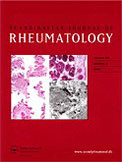Sedivá A, Poloučková A, Podrazil M, Froňková E, Kalina T. Scand J Rheumatol. 2011 Mar;40(2):158–60. Epub 2010 Sep 28. IF: 2,507

Abstract:
Schnitzler syndrome is a rare autoinflammatory disorder characterized by inflammation with atypical IgM monoclonal component. As there are currently no data regarding the B lymhocytes in this disorder, we performed a detailed longitudinal analysis with an emphasis on the B cell compartment. The investigation revealed an increase in the population of recent bone marrow emigrants, the so-called transitional B cells. We further observed a borderline increase of naive B cells and a decrease in the switched-memory B cells. During 3 years of follow-up, the patient persistently presented with extremely low plasma cell numbers in peripheral blood, a paradoxical finding given the still-present IgM monoclonal component. Clonality was confirmed by an Ig heavy chain rearrangement assay, which showed a minor clonal peak in a polyclonal background. We further show that the administration of IL-1RA, anakinra, in a patient with Schnitzler syndrome induced fast and dramatic clinical responses that corresponded to changes in inflammatory markers. Elevated neutrophil counts and CRP levels dropped sharply within the first week of treatment and stayed stable for the whole follow-up period. In contrast, the treatment had no effect on any parameter corresponding to an adaptive immune response. In conclusion, we describe dual effects of anakinra treatment on Schnitzler syndrome, with positive influence on innate immunity and lack of effect on markers of adaptive immunity. Abnormalities in the B cell compartment in Schnitzler syndrome are consistent, regardless of anakinra administration.
-im-